Finding affordable SEO services for small businesses isn’t an easy task for sure. With SEO being such a complex field, it’s hard to know what services do you need or whether a company’s gonna do a good job or not.
That’s why it’s important to have at least an idea of what SEO services are important, which practices are useful and which are harmful.
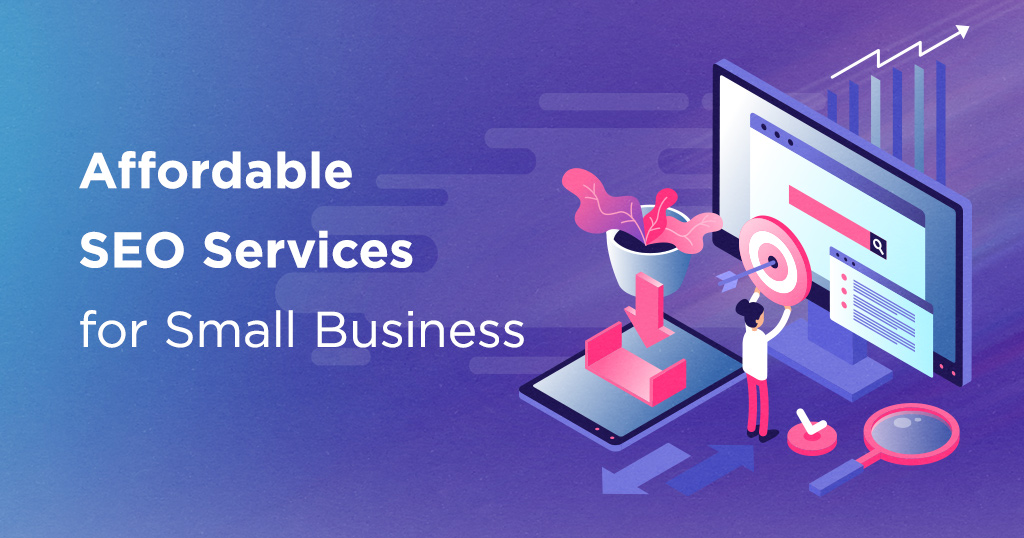
Many times, SEO companies offer their services in the form of a monthly SEO package. While it’s easy for search engine marketers to manage their work this way, and a lot easier for you to understand what you get for the buck, it’s also a big indication of automatization, which stands, generally, at the base of SEO penalties.
This article will not be a list of companies to pick from, but a guide on which services you should be looking for and how to choose the right company.
So, read this guide till the end to get the insights you need.
- Why Should Small Businesses Invest in SEO?
- What SEO Services Do Small Businesses Need?
- Types of Affordable SEO Services for Small Business
- The Top 5 Must-Have Affordable SEO Services for Small Business
- How to Pick The Right SEO Company to Work With
Why Should Small Businesses Invest in SEO?
If you’re a small business looking for affordable SEO services, you’ve probably just started out as an entrepreneur.
But why choose SEO as a marketing channel?
The main reason why small businesses should consider SEO as a marketing channel is that you can either invest time or money into it.
That gives you some liberty, in case you don’t have one or the other.
While other channels, such as PPC, can offer faster results, SEO is a long-term game, but can bring in the greatest ROI.

The key here is to start it as early as possible, so you can benefit off it for as long as possible. Postponing it will only allow your competition to get ahead, making your job harder.
If you’re interested in the pros and cons of these two marketing channels, take a look at this article about SEO vs PPC.
But again, if PPC seems like a more viable option for you now, you should still start investing in SEO as soon as possible.
What SEO Services Do Small Businesses Need?
It’s hard to say what SEO services a business needs because it differs from business to business.
Do you have a local store? Or an online one? Are you a blogger or an affiliate or do you offer services, be them physically, such as plumbing, or online, such as consulting?
In general, small businesses lack quality content and promotion.
Quality websites are easy to build these days using templates and content management systems, but quality content isn’t easy to write.
Also, once the website is live and even with quality content on it, it’s still not enough. You need to know how to promote it to show Google that it’s valuable.
Types of Affordable SEO Services for Small Business
We’ll go through multiple categories so that you can have a better idea what affordable seo services for small business you might need, depending on your case.
In the end, you’ll need a bit of everything, so consider this list as a set of priorities.
1. For Technical SEO
The truth about technical SEO is that it is, in general, a one-time fix. While you have to change things from time to time as the internet evolves, if you set things right from the beginning, they will last.
Here are the top Technical SEO issues that small businesses should focus on in their online marketing strategy:
- URL and Site structure: While you can do this on your own, it’s probably a good idea to ask an SEO consultant for advice. The most difficult site to structure is an eCommerce one. You want to get it right from the beginning to avoid issues in the future. This will save you a lot of money. Find out more about a good website and URL structure.
- Image Compression: Images are probably the biggest problem when it comes to technical SEO and load times. In many cases, it can be done for free with tools such as Smush for WordPress, but similar free plugins are also available for other platforms.
- Caching: If you use caching, your site will load even faster. Again, good caching can be achieved for free with plugins such as W3 Total Cache or Autoptimize. Some hosting providers have LiteSpeed Caching on their server, which also allows you to cache your content properly.
- Structured data: This should be the last thing you focus on as a small business. However, in certain cases it can have a good impact. Just make sure you don’t focus on this technical aspect instead of what’s really important, which is quality content and promotion.
Here are some tools that can help you ensure you won’t be spending much on Technical SEO issues:
WordPress:
The best affordable SEO service for Technical SEO when it comes to small businesses is WordPress.
You need an optimized, mobile friendly website over which you have control and can maximize potential without spending too much.
Web Designers are quite expensive, so WordPress is the way to go. You can find a variety of templates for a nice web design, many even for free.
Sure, there are other SaaS website builders there such as Wix or Squarespace (you’ve probably seen the ads by now), but they are very limited in terms of what you can do for your business’s SEO.

If you want to go with PPC only, SaaS website builders might be a good option, but for search engine optimization, even renowned SEO companies will have a hard time.
Even WordPress has its own SaaS packages, so make sure you compare both the open source version and the SaaS one.
In the open source one, you’ll need your own hosting, while the SaaS one will cover it.
In the long run, if you want to get the most out of it, the open source version is the best option, but it will be more difficult to manage.
GT Metrix:
GT-Metrix is a great service that will tell you about a variety of technical SEO issues your site is facing.
The most important things you want to make sure you fix are large images and caching.
While all these tips are useful, what you should be focusing on is the load speed of the website, in seconds.
PageSpeed Insights:
Just like GT Metrix, Google offers a similar tool, called PageSpeed Insights.
You can view a variety of technical issues which Google considers you should fix.
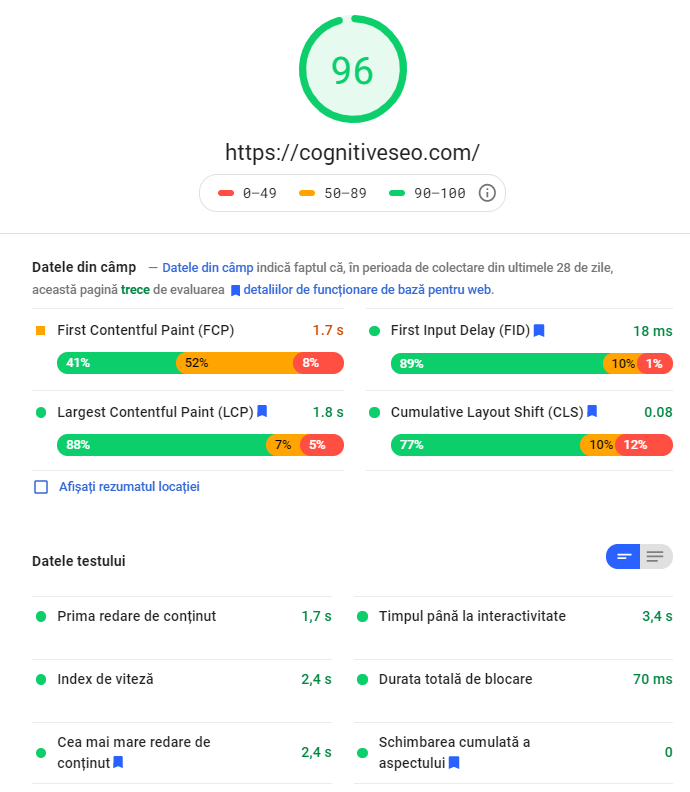
The most important one, again, is the speed at which your website loads (First Contentful Paing and Time to interactive)
Xenu Link Sleuth:
Xenu Lunk Sleuth is a free tool you can use to crawl your website and identify missing title tags or 404 errors.
You can also use this to quickly map titles to URLs if you’re in the process of rewriting your titles in order to improve OnPage SEO.
In the tool itself you can also visualize where a pages is linked from internally within your site.
CognitiveSEO Toolset:
The CognitiveSEO Toolset is an affordable seo services for small business that can help you with more complex issues like website structure. Instead of analyzing everything on a page by page basis like other tools, our tool lets you take advantage of APIs to analyze your entire site at once.
Furthermore, you’ll be able to view the entire structured in an easy to understand manner, inside the dashboard.
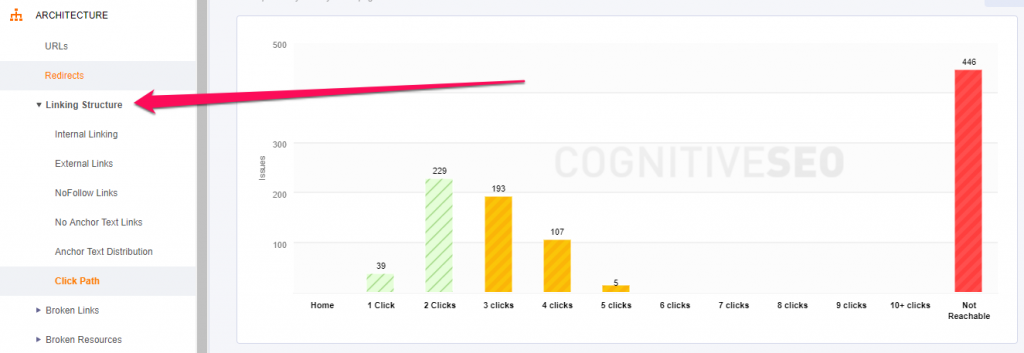
2. For Content Marketing
- Keyword research: Keyword Research is crucial if you want to set the basis of your OnPage SEO strategy on content marketing. If you don’t know what people are searching for, you don’t know what to optimize your pages for.
- Copywriting: While good copywriting isn’t cheap, it’s worth investing in it. Good copy sells, and that’s what you need on your website, especially if you’re just starting out. Sure, a content marketing strategy is based on information not sales, but what if you could give out information that sells? That’s where copywriting kicks in.
- Editorial Calendar: Content marketing is a long-term game, so developing a schedule can really help you move things forward with ease. It’s mostly based on keyword research, but you have to map things out into hubs or silos and decide which ones to prioritize and how they can better facilitate and consolidate your site’s structure.
Here are some services and tools which you can use to find keywords and develop a better content strategy.
Google Autosuggest & Keyword Planner:
The Google Autosuggest tool can be really helpful in finding out what people are searching for on the web in real time.
Just start typing in a seed keyword and Google will fill you in on the details.
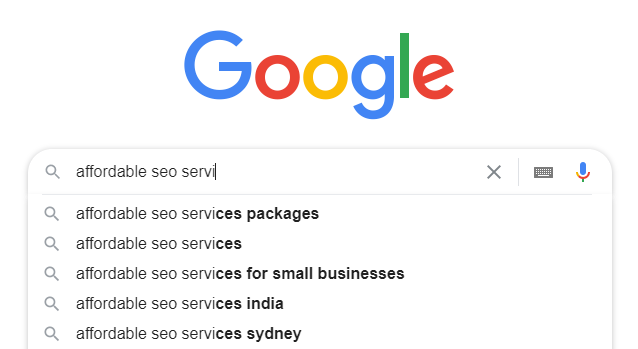
Moreover, at the bottom of any results page you’ll see a list of related keywords which you can use.
Furthermore, if you’re already using Google Adwords, why not use the keywords you’ve found there for organic search as well?
Reddit:
Reddit is a great source for finding new hot topics in your domain. You just have to look at subreddits relevant to your niche.
Sometimes, it might not be easy to find them but try to think outside the box. Once you’re close, start following that thread.
Don’t just rush on adding links to your website, or you’ll get banned quick enough. First, you’ll have to build your profile by answering threads and even starting popular ones.
If you’re a consultant, you can start by answering threads to some extent, then offering individuals to help them further in Private Messages.
There you can determine if you’re a good fit and offer your services.
Eventually, once you’ve gained enough karma, you can start answering people partially and adding a link to your blog where you expand on the topic, for those interested in finding out more.
CognitiveSEO:
The CognitiveSEO Content Assistant is a great tool that can help you quickly improve Google rankings, only by changing your content a little bit.
You can try it for free here.
First, type in what keyword you want to optimize for, then go to the Content Assistant section and the tool will provide you with a list of keywords you should use in your content to improve your site’s rank in Google.
It’s that simple!
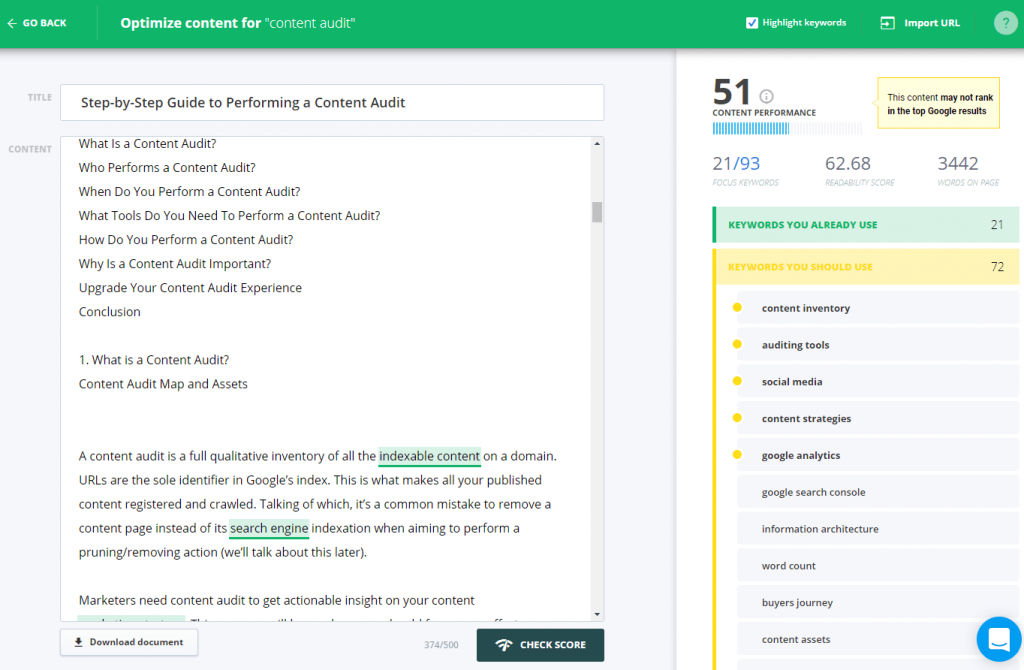
Of course, take it with a grain of salt. You don’t have to force a keyword in if it doesn’t fit. You can change it a little so that it makes sense. Think of the important keywords there as topics of subjects you need to address in your page.
3. For Link Building
Link building is probably the hardest thing to do these days. Everyone is aware of it, nobody wants to link to you (without money) and even Google is on it, penalizing you for it.
Use the Link Reclamation Tool
Building white-hat links of high value and in accordance with Google’s guidelines have been a pain point for years now.
The broken pages and link reclamation technique might be familiar to you as they are quite old school strategies.
We documented this technique a lot, so find out way more about the link reclamation technique, when and how to use it to deliver maximum results.
Analyze Your Competitor’s Links
More often than not, your competitors, especially the ones ranking high in search results, are doing some things very well.
Why not use what they are doing to improve your own SEO rankings?
The CognitiveSEO Backlink Analysis tool can identify what backlinks your competitors are using to rank high. Even more than that, you can use the Unnatural Link detection to filter bad links and focus only on the best ones.
You can also use it for competitive analysis, to see where you are positioned compared to your competitors. This can help you identify websites ranking to multiple competitors, indicating that it might be easier to obtain.
Blog Commenting:
Many SEO experts consider this to be a spammy method, but in fact, it isn’t. It can be. However, I’m not recommending spam in any way.
I’m talking about identifying websites and blogs talking about related topics to your small business and engaging with them, just as you would do on Social Media.
You’ll often see companies offer services such as blog commenting in their ‘affordable’ SEO packages, but be wary, as more often than not, it’s spam.
The goal here is to build connections with other websites or bloggers in the field. Then maybe you can land a deal with them to promote your website.
Guest Posting:
By engaging with relevant bloggers through blog commenting, you might get to know a blogger well enough to ask them for a guest post.
Guest Posting is when you write an article for another website, under your name. Usually, you’ll be able to link back to your website.
Expanding this is now considered a dangerous practice, but doing it in moderation won’t affect your site in any way.
Outreach:
Guest posts or simply links can also be obtained through direct outreach.
However, you have to build some sort of connection first. Being genuine is the best way and I’ve had the most success with it.

Always start by giving something and not expecting something in return. Once you’ve got a reply, you can push a request, but don’t be demanding.
Many people sell links on their websites for hundreds of dollars. So when they give you one for free, you should really appreciate it.
Check out these outreach examples to boost your response rate.
Blogging (with a twist):
Last but not least, content marketing can be really useful for search engine optimization in the long run. However, it won’t be enough to write articles in order to get links.
You’ll have to write articles that people want to share and that’s not easy.
You can do it the tricky way, by identifying an influencer and writing about something you know they’ll share, or following another strategy such as writing case studies or funny things.
Either way, even if blogging and content marketing won’t help you get links in the end, it’s still a good way of consolidating and optimizing your website’s structure.
4. For Rank Tracking
Measuring an SEO strategy is crucial for determining the success of an SEO campaign. Whether you work with an SEO firm or not, it’s a good idea to monitor the results on your own.
Here are some methods you can use to effectively track your rankings and results:
Google itself: The oldest method in the basket. Just open Google and type your keyword. Make sure you do it in Incognito mode, to get rid of personalized search results.
Google Search Console: The Google Search Console is a free tool provided by Google which will monitor where your site’s getting traffic from, as well as the average positions for the keywords that brought the traffic.
CognitiveSEO Rank Tracker: If you’re looking for something a little bit more advanced, take a look at our rank tracker. Not only will it show your SEO rankings, but it can also notify you of drops and will provide a graph for each particular keyword. Using our tool you’ll also be able to monitor your competitor’s rankings, if that interests you.
![]()
5. For Local SEO
When it comes to local SEO, you can actually completely dominate the entire page of Google with multiple positions.
Here are the most affordable things you can focus on to improve rankings:
Google MyBusiness:
Google MyBusiness is the most important SEO service you should focus on as a small local business.
Setting up a GMB listing isn’t particularly difficult. Just make sure you use your keywords in the name and description and fill in all the information correctly.
However, ranking Google MyBusiness listings high isn’t as easy, but it can be achieved by implementing a set of practices in your company, such as asking for reviews or getting in the local newspaper.
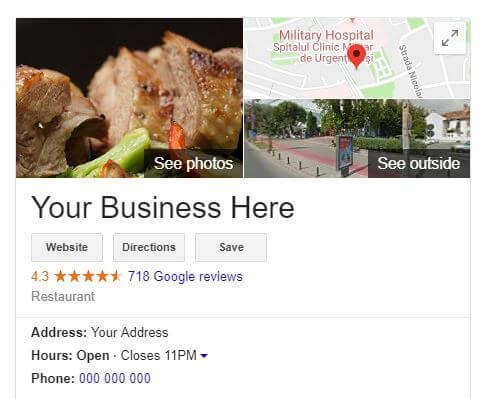
Social Media Accounts & Posting:
In local search results, Facebook pages can actually rank pretty high for particular keywords.
Make sure you use that to your advantage by optimizing the title and description on Facebook to also include the keyword you’re trying to target.
Also, posting regularly on Facebook can help you bring some traffic to your website. Just remember the 80 20 rule, in which you only try to sell them 20% of the time.

If your posts are only promotional, people won’t engage with them and the reach of all your posts will be reduced over time. You have to attract engagement and also engage with your audience yourself.
You might think that small local businesses can’t go viral, but the The White Moose Café would prove you wrong.
Citations & Accurate NAP:
Citations are like backlinks, but they only mention your brand’s name and don’t necessarily contain a link back to your site.
NAP stands for Name, Address and Phone and you want to make sure these are consistent across the web.
Therefore, using a different phone or address or different opening hours across different platforms such as Google and Facebook might look confusing to Google, just as it would to your clients.
In a way, you’re bringing all these channels and platforms together to form a stronger union that will rank better overall.
You can also purchase advertising in local media, if they are affordable. If you’re in a small town, that works, but in big cities such as New York… though luck!
Local Adjacent Niches Partnerships:
A great way of getting some traction with local SEO is to partner up with other local businesses in your proximity.
The businesses can promote each other locally in their own store, as well as online on their websites.

They don’t have to be competitors, but at least somehow related or relevant to your niche.
So if you sell hunting rifles, it’s probably not a good idea to try to partner up with a vegan restaurant.
For example, if you sell luxury watches, why not partner up with the luxury suits store across the road? Everybody wins!
6. For Video SEO
Video SEO can help you grow your business. More and more people prefer video content over traditional, written one.
It’s hard to pinpoint an affordable seo services for small business for video, as you can’t really optimize videos the same way you optimize blog posts. Once you’ve published it… it’s done.
Sure, you can still change titles and descriptions to better optimize them but, as a whole, you have to get things right from the start.
Here are a few tips you can follow to rank better with video or complement your content marketing strategy with a video SEO as well.
- Keyword Research: Just as with regular SEO, you want to know what people are searching for before you create a video. Sometimes, it’s hard to match a topic or new idea you have to a keyword, but try your best to do it. This way you’ll get the best out of both worlds.
- Optimized titles & descriptions: Use the identified keywords in your title and description. Don’t cheap out on the description, even if not many people will read it. Populate it with complementary info such as links to sources.
- Short Product Presentation Clips: If you sell products online, make sure you have video presentations of them. People are busy, so short and to the point ones will be best. These days, you can do everything with a phone. There is a multitude of video editing software for both Android and Apple.
- Consistency: While posting a few clips here and there might work if they rank high for your target keyword, if you want to have real success with video, you’ll have to do it on a regular basis.
- Interlinking between videos: Let’s face it: most video content happens on YouTube. And YouTube wants its users to stay on YouTube. So have multiple videos related to one another. Send people from one video to another so that they spend more time on YouTube and YouTube will reward you.
- Repurpose content: If you’ve already been blogging for a while, you can use those topics to create video content. Then, simple interlink the video and blog post. You can do this vice-versa, if you’ve been focusing your time on video content instead.
7. For Ecommerce SEO
eCommerce SEO services are the hardest to find at affordable prices. If you have a small eCommerce SEO business, consider spending your own time in learning SEO, as services might be expensive and the cheap ones will most probably not be very effective.
Site Structure: Structure is the most important thing for eCommerce websites, because of filters and faceted navigation. So make sure you get it right from the beginning. It might be expensive for big sites, but it’s very effective and it will save you a lot of time and money in the future.
You can use the CognitiveSEO Site Audit Tool to analyze your site and ensure a proper structure. From URLs, 301 redirects and canonicals to internal linking, the tool has everything covered.
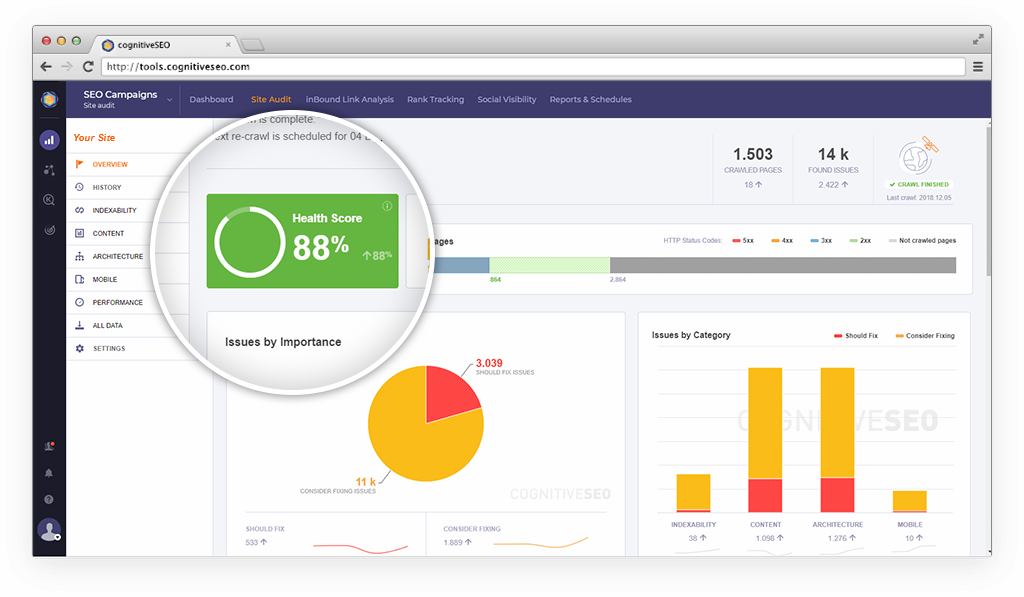
Well optimized titles: Very often, people ignore the basics. They focus on ‘secret’ strategies and completely forget that their titles aren’t optimized. Of course, this assuming that you’ve done your keyword research already.
Blogging: eCommerce sites lack quality content. Most products have short descriptions and the structure itself is only built as a silo between categories and products. However, you can consolidate that structure with interesting articles. They will also ease your job into bringing natural backlinks to your website.
Copywriting: Many eCommerce store owners ignore copywriting. However, each product page is, in fact, a landing page. And landing pages need copy. You need copy to sell. Most copywriters are also good at writing for SEO as well, which will also benefit your site.
Structured Data: While structured data is the last thing you should think about (keywords, titles, content, speed are more important), it’s very relevant for eCommerce websites, as they can help enhance Google results for products.

The Top 5 Must-Have Affordable SEO Services for Small Business
If it was to draw the line at the most important ones, in general, for all types of websites and businesses, it would be this:
- Keyword Research: You can’t have an effective SEO strategy without proper keyword research.
- Well optimized titles: People ignore the basics more often than you’d think. Make sure your titles are properly optimized.
- Google MyBusiness: GMB is a very effective tool and it’s also free. Spend some time optimizing it and it will bring good results.
- Copywriting & Blogging: Content is still very important, and copywriting can greatly help you increase sales, which is your goal in the end, isn’t it?
- Social Media Posts: Social media can help you promote your website easily, even without paying for it. With a little bit of talent and some knowledge, you can generate decent traffic.
However, in some cases, many better others apply. The best thing you can do is get in touch with an independent SEO consultant to get some tips.
How to Pick The Right SEO Company to Work With
If you’re looking for affordable SEO services, that’s an indication you’re already looking to invest money, so you’re probably looking for an SEO firm.
While I can’t provide a list of companies (there are too many factors to take into consideration, such as language, location, type of website and others) I can provide some tips on how to how to find a good one.
To be honest, the secret here isn’t finding the best service at the lowest price, but to avoid bad/destructive cheap services.
Here are some questions you can ask SEO companies to avoid being tricked.
Cheapness and quality is a rare combination, so if you’re on the hunt for it, you have to be very well prepared with knowledge.
There are many reasons cheap services can be bad: spinned content, cheap links or PBNs, for example.
If an SEO company offers affordable SEO packages on a monthly basis, be suspicious.
It’s not that companies that offer packages aren’t good, but it’s a good indication they are automating everything, which leads to patterns, which can lead to penalties.

You should talk to one of the SEO experts in the company before signing.
If you just purchase the package and receive the “SEO audit” via e-mail a few days later, be sure that it was automated.
They should be asking questions about your business. How else would they know how to properly promote you if they don’t know anything about you?
First, ask them if their strategies are what most search engine marketers would call ‘white hat’ or safe.
If the answer is no… I think you know what to do.
If the answer is yes, then you should also follow up with these important questions:
- Do you use Spam?
- Do you use PBNs?
- Do you use automation tools? If yes, which ones?
If the answers to those questions are yes, you might want to avoid the company. Some automation tools, such as ones for e-mail newsletters or for scheduling posts are fine, but others such as scraping content or spinning it are not.
Additionally, you should ask the SEO firm:
- How long have you been working in the field?
- Can you give me some examples of websites you’ve optimized before? What strategies have you used on them?
- Will a real person perform an audit or at least analyze it?
- Who will write the content on my website?
- How will we measure the performance of the SEO campaign?
- Can you tell me what exactly my money will go to? Will you execute all the work or do you outsource?
If you get a competent and clear answer to these questions, it’s a good indication that who you’ll work with knows what they’re doing and are well-intended.
Ultimately, it’s up to you who you sign with but, hopefully, by now you have a better understanding of how to choose good affordable SEO services for your small business.
What affordable SEO services for small business do you think are the best? Let us know in the comments section.
The post Affordable SEO Services for Small Business – The Mandatory List appeared first on SEO Blog | cognitiveSEO Blog on SEO Tactics & Strategies.
Via Digital http://www.rssmix.com/
No comments:
Post a Comment